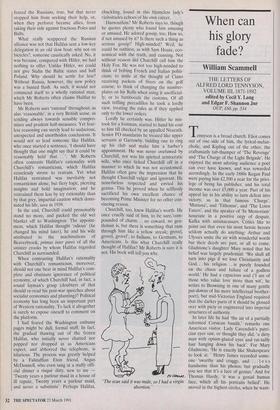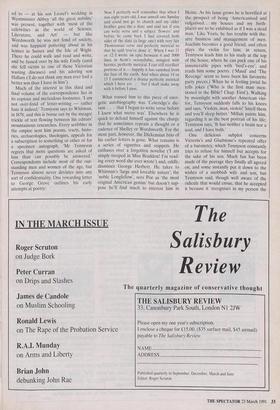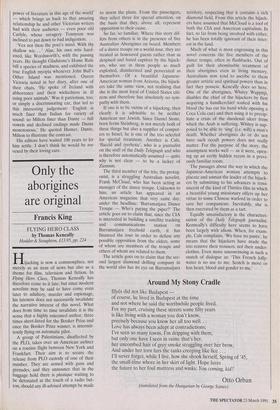When can his glory fade?
William Scammell
THE LETTERS OF ALFRED LORD TENNYSON, VOLUME III, 1871-1892 edited by Cecil Y. Lang and Edgar F. Shannon Jill- OUP, £60, pp. 534
nnyson is a broad church. Eliot comes
Te out of one side of him, the lyrical-melan- cholic, and Kipling out of the other, the craftsmanly tub-thumper of 'The Revenge' and 'The Charge of the Light Brigade'. He enjoyed the most adoring audience a poet can ever have known, and was rewarded accordingly. In the early 1880s Kegan Paul were paying him £2,500 a year for the privi- lege of being his publisher, and his total income was over £5,000 a year. Part of his appeal lay in his ability to turn defeat into victory, as in that famous 'Charge'. 'Mariana', and `Tithonus', and The Lotos Eaters', and the speaker of 'In Memoriam' luxuriate in a positive orgy of despair, ICafka with antimacassars. Critics like to point out that even his most heroic heroes seldom actually do anything: Arthur and Ulysses smite the air with wonderful words but their deeds are past, or all to come. Gladstone's daughter Mary noted that his belief was largely prudential: 'We shall all turn into pigs if we lose Christianity and God. . . his religion. . . is purely founded on the chaos and failure of a godless world.' He had a capacious soul CI am of those who value love more than wit', he writes to Browning in one of many gentle put-downs of his more intellectual brother- poet), but mid-Victorian England required that the darker parts of it should be glossed over with piety or engineered into imperial structures of authority.
In later life he had 'the air of a partially reformed Corsican bandit,' remarks one American visitor. Lady Cavendish's patri- cian eyes saw, or thought they did, 'a dirty man with opium-glazed eyes and rat-tailly hair hanging down his back'. For Mary Gladstone, 'He is exactly like Shakespeare to look at. ' Henry James recorded some- one 'swarthy and craggy, and ...less handsome than his photos: but gradually you see that it's a face of genius.' And for Thomas Hardy, 'it was a genial human face, which all his portraits belied'. He moved in the highest circles, when he want- ed to — at his son Lionel's wedding in Westminster Abbey 'all the great nobility' was present, together with 'most of the celebrities in the world of Science, Literature, and Art' — but like Wordsworth he was not fond of society, and was happiest pottering about in his homes in Sussex and the Isle of Wight. There he could walk and read and write, and be fussed over by his wife Emily (until she fell victim to one of those Victorian wasting diseases) and his adoring son Hallam CI do not think any man ever had a better son than I have in him').
Much of the interest in this third and final volume of the correspondence lies in its copious and meticulous footnotes. 'I am not over-fond of letter-writing — rather hate it indeed,' Tennyson says to Whitman, in 1878, and this is borne out by the meagre trickle of text flowing between his editors' mountainous researches. Every scribbler in the empire sent him poems, tracts, histo- ries, archaeologies, theologies, appeals for a subscription to something or other or for a specimen autograph. 'Mr Tennyson regrets that more questions are asked of him than can possibly be answered.' Correspondents include most of the out- standing men and women of the age, but Tennyson almost never deviates into any sort of confidentiality. One rewarding letter to George Grove outlines his early attempts at poetry: Now I perfectly well remember that when I was eight years old, I was unwell one Sunday and could not go to church and my elder brother gave me a slate and said see if you can write verse and a subject 'flowers' and before he came back I had covered both sides of the slate (a large one) with very fair Thomsonian verse and perfectly metrical so that he said 'you've done it'. When I was 11 or 12 I wrote an epic between 4 and 5000 lines in Scott's octosyllabic, mingled with heroics, perfectly metrical. I can still recollect portions of it — happily it has vanished from the face of the earth. And when about 14 or 15 I commenced a drama perfectly metrical which I have yet. . . but I shall make away with it before I pass.
What roused him to this piece of ener- getic autobiography was 'Coleridge's dic- tum . . . that I began to write verse before I knew what metre was'. Elsewhere he is quick to defend himself against the charge that he sometimes repeats a thought or a cadence of Shelley or Wordsworth. For the most part, however, the Dickensian brio of his earlier letters is gone. What remains is a series of vignettes and snippets. He enthuses over a forgotten novelist CI am simply steeped in Miss Braddon! I'm read- ing every word she ever wrote') and, oddly, dismisses George Herbert. He takes to Whitman's 'large and loveable nature', the 'noble Longfellow', sees Poe as 'the most original American genius' but doesn't sup- pose he'll find much to interest him in
Heine. As his fame grows he is horrified at the prospect of being 'Americanised and vulgarised. . my houses and my birth- places are to be exhibited as if I was a dead man.' Like Yeats, he has trouble with the- atre business and management of men. Joachim becomes a good friend, and often plays the violin for him; in return, Tennyson leads him to his study at the top of the house, where he can pack one of his innumerable pipes with 'bird's-eye', and reads him some poetry. (Nand' and 'The Revenge' seem to have been his favourite party pieces.) When he is feeling jovial he tells jokes ('Who is the first man men- tioned in the Bible? Chap. First'). Walking by moonlight with another American visi- tor, Tennyson suddenly falls to his knees and says, 'Violets, man, violets! Smell them and you'll sleep better.' Millais paints him, regarding it as the best portrait of his life; Tennyson says, 'It has neither a brain nor a soul, and I have both.'
One delicious subplot concerns Victoria's and Gladstone's repeated offer of a baronetcy, which Tennyson constantly tries to refuse for himself but accepts for the sake of his son. Much fun has been made of the peerage they finally all agreed on, and some instantly put it down to the wishes of a snobbish wife and son, but Tennyson said, though well aware of the ridicule that would ensue, that he accepted it because it 'recognises in my person the power of literature in this age of the world' — which brings us back to that amazing relationship he and other Victorian writers had with their audience — even poor old Carlyle, whose savagery Tennyson was inclined to put down to bad indigestion. 'Vex not thou the poet's mind. With thy shallow wit. .. ' Alas, his own wits hard- ened, like Wordsworth's, with the passing years. He thought Gladstone's Home Rule bill a species of madness, and exhibited the true English myopia whenever John Bull's Other Island was mentioned. Queen Victoria noted in her diary, after one of their chats, 'He spoke of Ireland with abhorrence and their wickedness in ill using poor animals.' Was it patriotism, too, or simply a discriminating ear, that led to this interesting judgement: 'English is much finer than Italian for variety of sound: so Milton finer than Dante — full vowels and declined endings made Dante monotonous.' He quoted Homer, Dante, Milton to illustrate the contrast.
His editors have waited 100 years to let him settle. I don't think he would be too vexed by their loving care.




























































 Previous page
Previous page